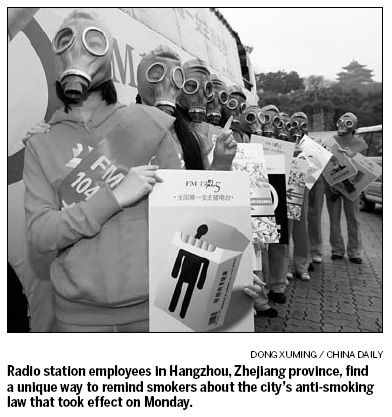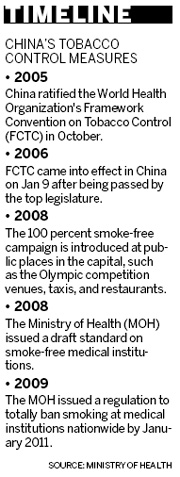Government and Policy
Smoke ban 'mission impossible'
By Shan Juan (China Daily)
Updated: 2010-03-03 07:35
 |
Large Medium Small |

No laws or enforcement to support control, medical official says
BEIJING: Vice-health minister Huang Jiefu slammed local health authorities on Tuesday for inadequate moves to stub out smoking in healthcare facilities, amid renewed efforts by the country to meet a full smoking ban in public places nationwide by next year.
| ||||
His comments came as Yang Jie, deputy director of the Chinese Center for Disease Control and Prevention's tobacco control office, said that currently, without legislation, a law enforcement mechanism or financial support an overall ban is "mission impossible in nine-months time".
Internationally, 17 of the World Health Organization's Framework Convention on Tobacco Control (FCTC) member countries, including France and Canada, have already fulfilled a 100 percent smoking ban at wide-ranging public venues like restaurants, work places and entertainment sectors, according to the WHO report.

"All of them have laws for that and act accordingly," Yang said.
In line with the FCTC, which specifies that member countries, including China, are obliged to undertake a comprehensive ban on tobacco in public places, the health authorities issued ordnances requiring all medical institutions nationwide to implement a smoking ban indoors before 2011.
However, less than 25 pecent of hospitals have implemented an indoor smoking ban, a 2007 survey found.
"To protect patients from harmful smoke, education alone is weak. Rather, hard-line measures like administrative punishment should be introduced to local health officials in charge," Huang said.
"Those who fail to meet the target should be replaced."
Currently, smoking bans are poorly implemented in medical institutions, particularly at smaller ones at the local level, experts said. A number of healthcare workers, especially surgeons, smoke themselves, despite knowing about the health hazards of tobacco.
"Some light up right after performing an operation," said Huang.
About 540 million non-smokers are exposed to second-hand smoke and about 1 million die of smoking-related diseases each year in China, out of 5 million deaths worldwide.











